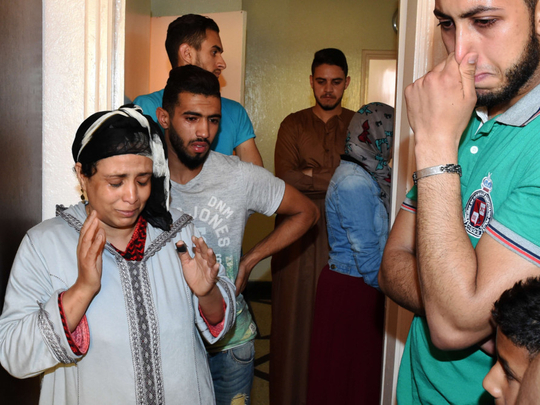
Rabat: Morocco said it was hopeful of finding its pilot alive after his F-16 crashed during a sortie for the Saudi-led coalition in Yemen, with the armed forces saying there was no evidence of his death.
Al Houthi militiamen claimed they shot down the fighter at the weekend, but the coalition denied rebel fire was responsible, saying the crash was due to a technical problem or human error.
The militia’s news channel Al Massirah has broadcast images of tribesmen celebrating around the wreckage of a plane, which they said had been shot down over Wadi Nushur, in Saada, northern Yemen.
The television channel has also shown debris of what appears to be a plane with a Moroccan flag and other images of a body in the wreckage.
Moroccos’s Royal Armed Forces (FAR) said late Wednesday there was “no formal evidence” to support “the theory of the pilot’s death”.
“Analysis of the photos and images relayed by websites and social networks showed it might be a montage,” the FAR said in a statement quoted by the official MAP news agency.
“The search continues by various means, and in the absence of tangible proof, the hope of finding the pilot alive remains our major concern,” the FAR said, without giving further details.
The fate of pilot Yassine Bahti, 26, has gripped the nation.
His family, who live in Casablanca, said Tuesday they hoped he was alive.
“I hope my son is alive and will return to his native land as soon as possible,” his father Nordine Bahti, a schoolteacher, said.
According to media reports, six FAR F-16 fighters have participated in coalition operations in Yemen.
In late March, Rabat said it had “decided to provide all forms of support to the coalition to sustain legitimacy in Yemen through the political, intelligence, logistical and military dimensions”.
Morocco is a close ally of Saudi Arabia. In 2011 the Gulf Cooperation Council, which groups the six Gulf monarchies, invited Morocco and Jordan to join.
While that did not materialise, the group subsequently created a $5 billion (Dh18.36 billion) fund on behalf of the two countries.












